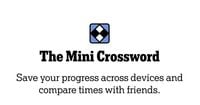For many puzzle enthusiasts, the New York Times Mini Crossword has become a daily ritual—a quick, clever challenge that fits snugly into a coffee break or a commute. But as of late October 2025, this beloved brainteaser is not just a game but a symbol of the shifting landscape of digital entertainment, where even the smallest pleasures are increasingly tucked behind paywalls.
On October 19, 2025, The Economic Times published the clues and answers for that day’s NYT Mini Crossword, providing a snapshot of the puzzle’s enduring appeal as well as the subtle frustrations of modern gaming. The Mini, a compact alternative to the sprawling traditional NYT Crossword, features 10 to 20 clues and is designed to be solved in just a few minutes. As The Economic Times notes, "The Mini allows players to enjoy a challenging yet concise puzzle experience." It’s a format that has attracted a devoted following, with fans drawn to its blend of pop culture, wordplay, and general knowledge.
The October 19 puzzle was rated a moderate 3 out of 5 for difficulty—a nod to its reliance on niche pop culture references. Among the clues: 1 Across, "Gross!" (answer: GAG); 4 Across, "Finish off, as a tube of toothpaste" (USE UP); 7 Across, "Argentine dance style" (TANGO); and 1 Down, "2023 Olivia Rodrigo album with the hit single 'Bad Idea Right?'" (GUTS). The puzzle’s 10 clues were split evenly across and down, challenging solvers to draw on everything from music trivia to word associations.
But for many, the most notable change to the Mini Crossword experience has been its migration behind the NYT Games App paywall in August 2025. While the puzzle remains accessible on the desktop site via certain workarounds (pressing "escape" a few times, for example), the move reflects a broader industry trend: what was once free now costs money, and what once cost money costs even more. As The New York Times itself mused in a recent crossword column, "Premium is the new regular, and so on." The digital age, it seems, is a world where commercials and subscriptions are ever-present, and even a five-minute puzzle is a commodity.
That tension between nostalgia and monetization was at the heart of the October 20, 2025, Mini Crossword, which was featured in both Parade and CNET. Both outlets published the day’s clues and answers, providing a lifeline for those stumped by the puzzle’s trickier entries. The across clues included: 1 Across, "Sound from a mouse" (CLICK); 6 Across, "Many-headed serpent killed by Hercules" (HYDRA); 7 Across, "View from a cruise ship window" (OCEAN); 8 Across, "See ya later!" (PEACE); and 9 Across, "Animal whose antlers can grow up to an inch per day" (ELK). The down clues were equally diverse: 1 Down, "Dice, e.g." (CHOP); 2 Down, "French for 'high school'" (LYCEE); 3 Down, "10 out of 10" (IDEAL); 4 Down, "Sound from a bat" (CRACK); and 5 Down, "Citizen ___" (KANE).
According to Parade, the Mini resets daily at 10 p.m., a detail that distinguishes it from other NYT games like Wordle and Connections, which reset at midnight. This quirky schedule has only added to the Mini’s charm, making it a fixture in the evening routines of countless solvers. CNET echoed this sentiment, describing the October 20 puzzle as "a tough one for a change! That 1-Across is going to slyly trick you as to what a mouse is." For those who needed a nudge, both publications offered hints and, eventually, the answers—CLICK for the mouse, HYDRA for the many-headed serpent, and so on.
The popularity of the Mini is partly due to its accessibility and partly to its cultural resonance. As Parade put it, "Working on the daily Connections, Wordle, and Strands is a whole ritual for many of us. And we can’t forget about the NYT’s The Mini Crossword, too!" For some, the day is not complete until all the free word games from the NYT have been conquered. Yet, as the paywall looms larger, these daily rituals are increasingly reserved for paying subscribers, or for those willing to hunt for workarounds.
Meanwhile, the full-sized NYT Crossword continues to evolve. On October 20, 2025, The New York Times published a daily crossword puzzle crafted by Adam Aaronson, themed around well-known pairs abbreviated with 'n.'—as in "Cookies 'n' Cream" and "Rock 'n' Roll." The puzzle’s theme, described by the Times as a "fantasy scenario for the digital age: a world without commercials," was both playful and poignant. The revealer, at 55-Down, was "AD FREE," a nod to the increasingly rare experience of content unbroken by ads or paywalls. As the constructor reflected, "What was once free costs money, and what once cost money costs more of it. Premium is the new regular, and so on."
This shift toward monetization is not unique to the NYT. Across the digital landscape, games, puzzles, and even news are moving behind paywalls, leaving users to weigh the value of their daily habits against the cost of subscription fees. For the NYT, the Mini Crossword’s new status as a paid feature is both a business decision and a cultural marker—a sign of the times, if you will.
Still, the appeal of the Mini endures. Whether accessed through the official app, a desktop workaround, or a helpful hint page, the puzzle remains a touchstone for community and curiosity. Its clues—ranging from the whimsical ("Sound from a mouse"—CLICK) to the literary ("Citizen ___"—KANE)—invite solvers to flex their mental muscles and share in a collective moment of discovery.
For those who crave more than just answers, the NYT offers guides on how to solve its crosswords and even encourages readers to submit their own puzzles. As the constructor of the October 20 puzzle noted, "Solving today’s puzzle may not rid us of the algorithms that bind, but it allows us to dream, and to enjoy a little wordplay in the world we have." In a landscape increasingly defined by subscriptions and algorithms, perhaps that small pleasure—of solving, sharing, and savoring—is worth every penny.




